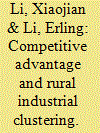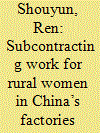| Srl | Item |
| 1 |
ID:
078024


|
|
|
| 2 |
ID:
139564


|
|
|
|
|
| Summary/Abstract |
This article explores the relationship between the sent-down youth movement and economic development in rural China during the Cultural Revolution. It examines ways in which sent-down youth themselves initiated improvements in rural life, and more importantly, how local officials used both their presence to acquire equipment and technical training and their skills and education to promote rural industry. The sent-down youth offices established in the cities and the countryside inadvertently provided connections between remote rural counties and large urban centres that enabled the transfer of a significant quantity of material goods, ranging from electrical wires and broadcast cables to tractors and factory machinery. Ultimately, we show how individual sent-down youths, their families, and both urban and rural officials – none of whom had a role in determining government policies – identified and made use of resources that those policies unintentionally produced.
|
|
|
|
|
|
|
|
|
|
|
|
|
|
|
|
| 3 |
ID:
153639


|
|
|
|
|
| Summary/Abstract |
Industrial subcontracting work in rural China has been framed as a win-win strategy for women and industry. Drawing on fieldwork conducted in Hebei Province, I argue that far from being the main beneficiaries of subcontracting work, such rural industrialization has instead subjected women to a gendered form of capitalist exploitation. First, the women employed were not a random group but were young, healthy women who already had industrial skills, and thus did not need training. Second, these women were rendered immobile by their family responsibilities. Third, the problems of ‘left-behind’ children and an urban, modern notion of motherhood trickling down to the countryside has constructed a notion of virtuous motherhood. Further undermining their position, women workers had no influence over production or profits in the subcontracting chain. Despite the promise that subcontracting work would be flexible for women, such flexibility benefits the production chain more than women workers. Local (and changing) gender and development dynamics in rural China condition the experiences of women involved in initiatives that are seen as a win-win situation by some development agencies, advocacy groups and policy researchers.
|
|
|
|
|
|
|
|
|
|
|
|
|
|
|
|